The ‘Gibson, Huberman’ Stradivari now owned by Joshua Bell has a history worthy of a blockbuster thriller. Stolen twice in the 20th century, the second time it remained undiscovered for nearly 50 years despite being played in public regularly by its thief. In this article from January 1998, Carla Shapreau reported on a final courtroom chapter
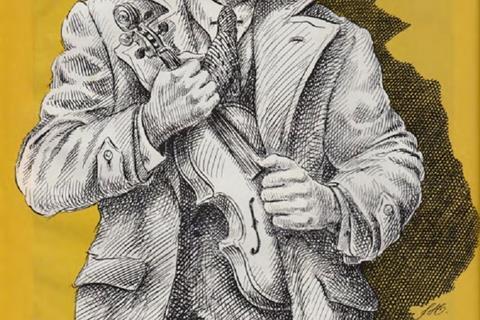
Discover more lutherie articles here
Click here to purchase a poster of the Antonio Stradivari ‘Huberman’ violin 1713
While the lives of most violins do not encounter the underworld of crime, the 1713 ‘Huberman’ Strad has crossed this unseemly threshold, yet re-emerged. This century it has been stolen twice — both times from the great Polish violinist Bronislaw Huberman — and for nearly 50 years it was played in New York and Washington DC, by a café musician who alone knew he played on the missing ‘Huberman’. And most recently, the story of its second theft has been the subject of a court case between a daughter and stepmother, fighting over reward money paid for its return.
The provocative epilogue to the ‘Huberman’s tale was revealed in detail in both an unreported opinion by the Superior Court of Connecticut (3 October 1995), and affirmed on appeal by the Supreme Court of Connecticut (31 December 1996). The judge described the testimony at trial as a ‘story more dramatic than the most contrived mystery show, which has the ring, in most part, of irrefutable truth,’ and also characterised the testimony as involving ‘long-secreted facts’.
The ‘Huberman’ Strad’s last disappearance was in 1936 when the violin was stolen from Huberman’s dressing room at Carnegie Hall while he was giving a recital on his Guarneri ‘del Gesù’. It was not until 1985 that the ‘Huberman’s’ location was finally discovered and, subsequently, authenticated and restored by Charles Beare.
In the mid-1980s, Julian Altman’s widow, Marcelle Hall, had been told by Altman on his deathbed that his violin was the stolen ‘Huberman’ Strad. When Altman died Hall sought to return the instrument to its rightful owner, then Lloyd’s of London, but she also wanted a financial reward and negotiated an agreement with Lloyd’s of London for a hefty finder’s fee of $263,475.75 in exchange for the long-lost ‘Huberman’ Strad. After the violin’s return in February 1988 it was sold for $1.2m to the prominent violinist Norbert Brainin, formerly of the Amadeus Quartet. Hall’s story at the time was that Altman had told her that he had bought the ‘Huberman’ from a ‘buddy’ who was the purported thief.
THE PROTAGONISTS
- The ‘Huberman’ Strad violin was made in 1713 by Stradivari
- Julian Altman was a café violinist who apparently possessed the ‘Huberman’ Strad from 1936 until his death in prison in 1985
- Marcelle Hall is Julian Altman’s widow and executrix
- Bronislaw Huberman was a Polish violinist and owner of the ‘Huberman’ Strad from 1911 until 1936
- Lloyd’s of London was the insurer that paid Huberman approximately $30,000 in 1936 when the Strad was stolen
- Sherry Altman Schoenwetter is Julian Altman’s daughter. Altman allegedly left the ‘Huberman’ Strad to both her and Sylvia Altman in his will
- Sylvia Altman was Julian Altman’s sister
The case is known as Marcelle M. Hall v. Sherry Schoentcetter. The topic of the legal dispute was whether the $263,475.75 finder’s fee that Hall had obtained from Lloyd’s of London in exchange for the ‘Huberman’ Strad, should be included in the Altman estate, thus benefiting Altman’s other heirs. Prior to the lawsuit filed by Altman’s daughter, Sherry Altman Schoenwetter, Hall had kept the finder’s fee for herself.
Although the lower probate court involved in the first legal disposition of the Altman estate found ‘no evidence as to Julian Altman’s participation in the theft of the ‘Huberman’ and stated that ‘Altman took the secret with him to the grave’, the superior court that reviewed the probate court ruling in 1991 was given surprising new testimony from Altman’s widow. The superior court judge stated that ‘Hall testified to Altman’s recitation, from his deathbed, in exact detail, of the planning and execution of the theft of the Strad’: that is, how Altman schemed with his mother to steal the priceless ‘Huberman’.
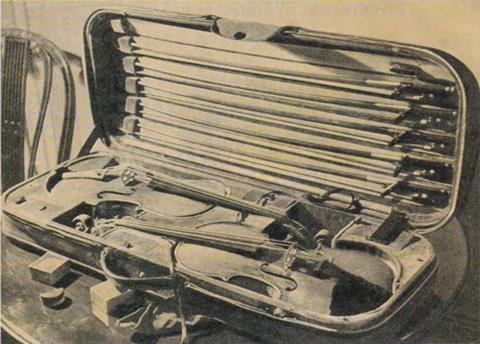
Altman died on 12 August 1985, aged 64, while incarcerated in the Litchfield County Correctional facility in Connecticut after being convicted of sexually abusing Hall’s grandchild. Altman’s last will and testament, executed on 19 July 1985, bequeathed certain assets to his then wife, Marcelle Hall, his daughter Sherry Altman Schoenwetter, and Altman’s sister, Sylvia Altman. Hall, as executrix, filed a tax return for the Altman estate which reflected assets of only $39,624.44. An interim accounting by the Probate Court was prompted in part by complaints made by Schoenwetter, who objected that Hall had failed to include in the Altman estate’s assets the $263,475.75 finder’s fee which she had obtained from Llovd’s of London for the return of the ‘Huberman’ Strad.
After Altman’s death in 1985, his widow took possession of the Strad, verified its authenticity, negotiated through legal counsel for its return to Lloyd’s of London and received the finder’s fee in February 1988, which was equal to 25% of the instrument’s value. But it has emerged that Hall failed to tell Lloyd’s of London the story that Altman revealed on his deathbed regarding the 1936 disappearance of the ‘Huberman’. Instead, Hall stuck by the story that Altman’s ‘buddy’ had stolen the instrument from Huberman at Carnegie Hall and sold it to Altman for $100, while Altman was playing in a gypsy orchestra at the Russian Bear, a café located in the back of the Carnegie Hall building.
The judge described the testimony at trial as ‘a story more dramatic than the most contrived TV mystery show, which has the ring, in most part, of irrefutable truth’
In or about 1970, Marcelle Hall met Altman in Washington, DC, where he played at the Georgetown Inn and the Jefferson Hotel. Although Altman apparently loved to play the violin, he did not prosper financially. On the advice of counsel, Hall and Altman were married in 1985 while Altman was jailed in Connecticut. The event was precipitated by Altman’s failing health; in 1985 he was diagnosed with stomach cancer.
At the 1995 Superior Court trial, Hall revealed the following facts:
In 1985, she went to visit Altman at the Hospital in Connecticut where Altman instructed her to obtain his violin from Ed Wick, a principal in the Danbury Symphony Orchestra. The violin was kept in a leather case enclosed in a zipped protective canvas sheath and Altman instructed Hall to open the canvas case and look at the materials between the outer shell of the violin case and the canvas cover.
Under the cover Hall found numerous documents, the most telling of which were copies of several newspapers from 1936, including The New York Times, The New York Evening Post and The New York Herald Tribune, detailing the instrument’s mysterious disappearance. Hall also discovered a copy of The Strad from September 1977, portions of which Altman had highlighted in pink.
Those highlighted portions read, in part, as follows: ‘The “Gibson” Stradivari of 1713 — named after George Alfred Gibson, a famous English violinist, and belonging to Bronislaw Huberman — was stolen in 1919 from his room at a hotel in Vienna. The instrument was in a double case which also contained several valuable bows and another Cremonese violin. The police were informed, and within a few hours of the theft the instrument was reported as having been offered to a Viennese dealer and the thief was caught red-handed. However this same violin was unfortunately stolen a second time in 1936 from the dressing room of Carnegie Hall in New York where Huberman was performing. He had the instrument fully insured and was paid full compensation for its loss, but the violin has never been heard of since.
- The Return of the Violin is a 2013 documentary about Huberman and the ‘Gibson’
The court stated that after Hall reviewed these materials she ‘returned to the hospital, shocked, and asked Altman: “Are you trying to tell me that this violin you’ve been [playing] all this time is the Gibson?” And he said, “Yes.” So then, I asked him, “How did you ever get your hands on it?” And he said, “Well, I had this buddy and he came into the Russian Bear… one night, opened his coat, took out a violin and said, ‘I have just stolen this violin from Carnegie Hall, and I’m in need of a hundred bucks. I’ve got to get my hands on it right away.’
Julian went and borrowed $5 here and $10 here and handed it to him. He said, “Now, I’ll tell you what I’ll do. I’ll let you take the violin. You take it to your boss and see if he can unload it, and if he can, we’ll split the take three ways.” And so he left the violin.’
Hall went on to testify that Altman had told her that: ‘He left the violin with him and the next day the boss said to him, ‘You better ditch that thing. It’s in every newspaper in New York.’ And so he ditched it by playing it for fifty-one years. When asked by her lawyer whether Hall believed Altman’s story, she responded: ‘No, I didn’t. But I asked him… “What does this buddy of yours look like?” And he said, “Well, he has dark brown hair, brown eyes. He’s a devil with the ladies. He’s a gambler.” And he said, “Whenever we would get short of money, he would go — We’d go to Grand Central Station — And he would pick pockets.” And I looked at him and I said, ‘“Sounds to me like you’re describing yourself.” And he said, “that’s not a very nice thing to say.’
[A]nd he said, “you’re right, though.” And that’s when he started to tell me, as he called it, “The Secret of my Violin”.’ According to the court, ‘[t]hereafter, during Hall’s later visits to the hospital, Altman would recite to her the various secrets of the violin.’
Hall then testified to a second scenario. She stated that ‘[h]e told me that he and his mother had conspired to steal a violin and that they had finally come to the conclusion because it was her idea that… The violinist should have two violins and he should also not live in the country because if he lived in the United States he would stay and see if he could get the violin back, and he would be very unhappy.’
The court explained that ‘[iln order to perfect the conspiracy, Altman and mom, as he called her, would review newspapers and do background research, always over a glass of tea, to determine when an unsuspecting target would be in the vicinity.’ Hall went on to testify that she ‘finally moved them to as close to Carnegie Hall and Steinway Hall as she could because this was always in the back of her mind, to get him the kind of violin she thought he needed.’
According to Hall’s testimony, Altman and his mother found their prey in Huberman, since he had two violins and lived out of the country. The plan was for Altman to tell his boss that he left his Bromo Seltzer at home, since he always had stomach pains, thereby creating an opportunity. Then he would walk over to Carnegie Hall carrying cigars to use to bribe the guards.
Hall explained that Altman was well known in Carnegie Hall because he played there often with one of the youth symphonies and could easily get in because they all knew him. ‘So he walked in, gave [the] guard a nice cigar, went to the bottom of the stairs, and he said that he had brought a cigar for that guard and it was known among his crowd that if you wanted to, you could give the guards… a cigar or a pack of cigarettes… He gave the guard a nice Havana cigar… and the guard looked at him. “Thank you Mr Julian.” … [Altman said] “Do you feel like having a smoke?” And [the guard] said, “Sure, I do.” [Altman] said, “I’ll watch [the door] for you. Go ahead. Everything’s cool.” [Julian then] went up the stairs. The guard left… He went up the stairs, opened his coat, had the violin, put it under his coat, went downstairs, stood next to Miss Ipican, Huberman’s assistant.’
Hall continued: ‘[a]nd as soon as they finished the big number with the forty-one instruments, they all started to come off, he went over to the side where he could exit to the front of Carnegie Hall, and nodded to a few people on the way. And then went up the outer exit, got a taxi, got in… Took it to his apartment.
His mother was waiting. She had the medicine in her apron pocket and had the keys to his bedroom. He always locked his bedroom… He went in, put the violin on the bed, he took the medicine, went out to the cab, went back to the Russian Bear.
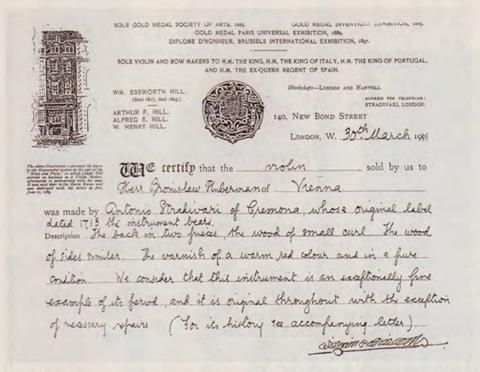
Aghast by Hall’s testimony, the judge commented that: Altman’s whole life was a fraud. Every time he pulled the Gibson out of its canvas protective case he must have rustled the newspaper clippings and other papers stuffed in the cover… It brings to mind the pitiful lament of Ladv Macbeth who cried out: “Will all great Neptune’s ocean wash this blood clean from my hands.” On his deathbed, after a life of silence, however, Altman was finally redeemed by revealing his innermost secret of the violin. Thereafter, on August 12, 1985, Altman died.’
Read: In Focus: the 1696 Stradivari ‘Archinto’ viola
Read: Janine Jansen on playing twelve Stradivari violins
Read: ‘Spectacularly colourful, loud and proud’ - The Strad Calendar 2023: The Australian Collection
Click here to purchase a poster of the Antonio Stradivari ‘Huberman’ violin 1713
Although Hall failed to reveal the second story of the theft to Lloyd’s of London, or to People magazine in 1987 when she gave an interview about the ‘Huberman’, she claimed at trial that the reason for not revealing the whole story was Altman’s sister, Sylvia, who was quite ill and ‘poverty-stricken’. Hall told of how Sylvia’s ‘beautiful Steinway piano was going through the floorboards of her house. I had a great deal of compassion for her. She had had a terrible life with her mother and brother. And now she had had to realize that her brother was going to jail for sexually abusing my grand-daughter. That was almost too much for her to bear, and I could not put on her shoulders the fact that her mother, who she loved, as most of us do of our mothers, was a crook.’
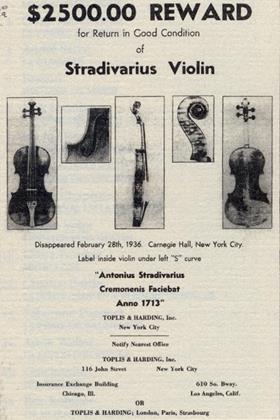
However, Hall’s testimony regarding Altman’s sister is controverted by a letter of 30 June 1990 in the court file in which Hall tells that Altman’s sister Sylvia knew all along of the conspiracy between Altman’s mother and Altman. Apparently, Altman and his mother made a tape together telling the whole story. Sylvia was listening to some of his tapes to get a handle on some music she might need when she stumbled over the tape that he and his mother had made describing the theft of the Strad. Hall said that Sylvia threatened to expose him but Altman sent her a letter threatening to kill her if she didn’t return the tape.
But is Hall’s recently revealed story true? Without a further investigation into remaining evidence, one can only speculate. Hall’s niece abandoned a collaborative book project with Hall about Altman and the ‘Huberman’ after determining that there were ‘irreconcilable inconsistencies in Hall’s various presentations of the story’ although Hall insisted that Altman had stolen the ‘Huberman’ throughout the collaboration.
Did Hall have a motive to create the second story that Altman had stolen the Strad himself? Hall’s faulty legal theory in the fight to keep the finder’s fee was that ‘a thief cannot benefit from his crime’; therefore, Altman should not be able to profit from the grave for his crime by including the finder’s fee in the assets of his estate. Instead, Hall argued that she should get to keep the hefty finder’s fee for herself. The court characterised this act as ‘her diabolical deed’, since by doing so Hall was found to have breached her duty as executrix to the Altman estate and its heirs.
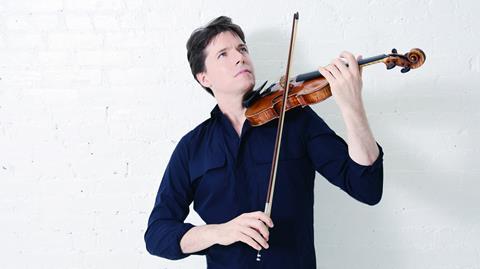
Rejecting Hall’s legal theory, the court stated that in a legal battle between two thieves, ‘the first thief prevails in an action against subsequent pilferers’, stating that ‘although the common law term for Hall’s act of appropriating the violin is conversion, in common parlance she, as executrix, stole the Gibson and with it the $263,475.75 “finder’s fee” from her deceased husband’s estate. As a result, she deprived Altman’s daughter, Sherry, of her rightful share of the estate’s most significant asset.’ The court went on to state that Hall ‘could not cite to one case in the whole world where the second thief had greater rights than the first thief’.
If Hall’s recently revealed story is true, the widow of the man that stole the ‘Huberman’ Strad has enjoyed the $263,475.75 finder’s fee since 1988. If any of the finder’s fee is left, Altman’s other heirs now have the legal right to recover that fee from Hall. Not a likely result Lloyd’s of London would have condoned in 1988, when it paid the finder’s fee. But Lloyd’s of London was only told a half truth, since Hall concealed purported facts regarding the theft when she negotiated the finder’s fee. This case adds yet another chapter to the history of the 284-year-old ‘Huberman’ Strad and those bound by compulsion or chance to its destiny.
Click here to purchase a poster of the Antonio Stradivari ‘Huberman’ violin 1713






















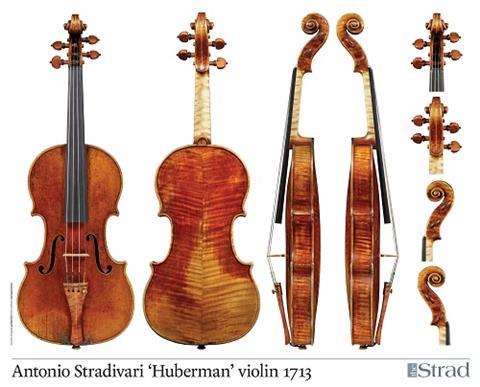




















No comments yet